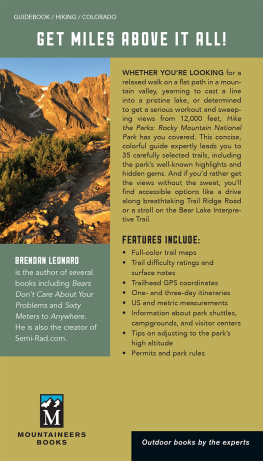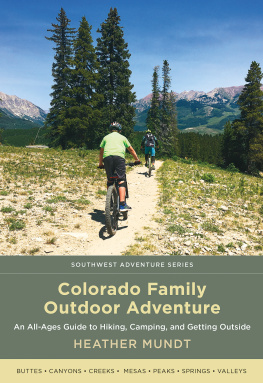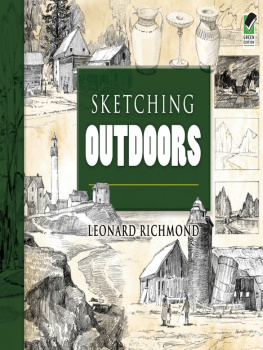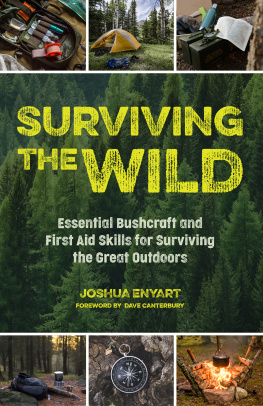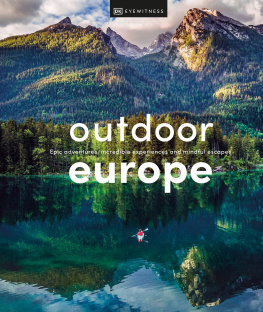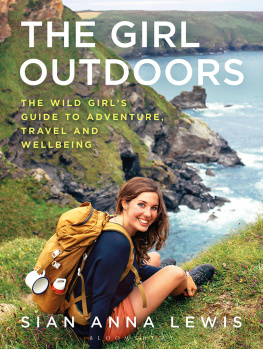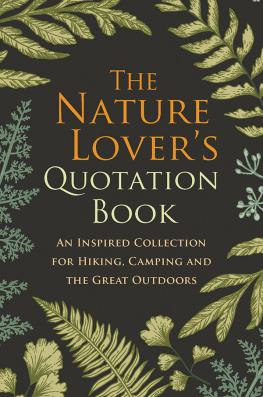
THE GREAT
OUTDOORS
A USERS GUIDE
Everything You Need to Know before heading into the wild (And how to Get Back in One Piece)
Brendan Leonard
Illustrations by Seth Neilson

new york
Contents
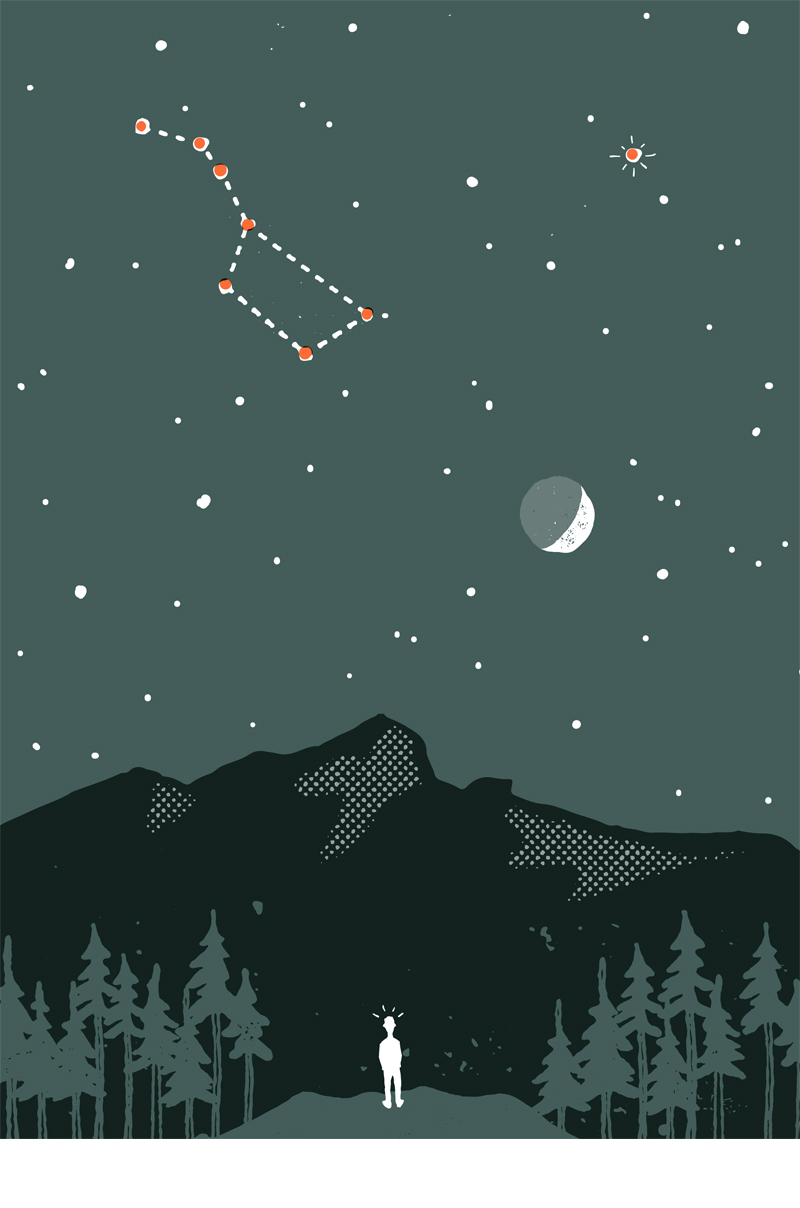
Introduction
Not too many generations ago, our ancestors hardly distinguished between indoors and outdoors. What we now think of as roughing it and camping were just a part of everyday life. People cooked over open fires, pooped on the ground, ran from animals bigger than they were, killed and ate animals smaller than they were, and walked around in the woods while doing what we would now call hiking.
Nowadays, most of us (okay, pretty much all of us) are disconnected from the outdoors, spending most of our days looking at glowing screens and not having to worry about staying clean and dry or fed. We only occasionally visit wild places, and some of us never see them at all. But do we, as a species, have some sort of submerged memory about those days of life in the outdoors and somehow miss them? Theres a sort of inherent, ineffable satisfaction we get from staring at the red-hot embers of a campfire, sleeping under the stars, or living for three or four days while carrying everything we need on our backseven though we know we dont need to do these things anymore given that we have gas furnaces, comfortable beds, and fully stocked pantries and nearby grocery stores at home.
So were lucky in that we get to choose to go on adventures in the outdoors as a respite from our comfortable lives, and to push ourselves to climb mountains, ride waves, and ski deep snow on steep slopes. But it can be tough to know where to startwhat kinds of activities you might be good at, what will challenge you most, mountains versus ocean, what kind of gear you need, and where you should go. It can be daunting, scary, and sometimes awkward as we fumble our way through a new endeavor (carving a turn on a snowboard is in no ones DNA, for example).
This book represents more than a dozen years of my personal fumbling through all the activities in it, learning the hard way so you dont have to. Ive spent my vacations and weekends climbing sheer rock faces, getting altitude sickness, paddling down rivers, pedaling across the United States, shivering in a sleeping bag, getting rained on, snowed on, and sunburned, swinging ice tools into frozen waterfalls, warming frozen fingers and toes, gaining experience but not necessarily skill, and wondering what the point of it all was more than once. The point of it is, of course, the accomplishment you feel from the doing rather than the watching, and the experience and joy you gain once you leave the comfy confines of your home.
The point of it is also this book, which I hope will help you dream up some adventures of your own, have some basic but essential knowledge that will help you be a little more confident and comfortable when you venture outand keep you healthy, alive, and thriving through all of it.
Man
Versus
Wild

S o youve got an idea that getting outside more might be funnot outside your office or your apartment but outside your city. There are so many activities to choose from, so many places to go, and so many different pieces of gear and equipment to buy and/or rent for those activities that it can all seem a little complicated and confusing.
So where do you start? This chapter. Itll give you some basic knowledge about what activities might be right for you, in what season each is best, gear items that would work well for your pursuits, how to get into nature, guidelines of where you can and cant go, and a few ideas for adventures to put on your wish list, as well as some straightforward principles for surviving in natureand not ruining it for everyone else. You dont go from neophyte to the summit of Everest in a couple of weeks, but a little knowledge and some basic gear are all it takes to get you off the couch and into the wild.
Why should I go outside?
There are plenty of studies showing that time outdoors is good for your physical health and mental well-being, that being in places that inspire awe makes you a more generous and happy person, and that camping for a week and avoiding non-natural light is enough to reset the bodys clock to natural sleep patterns. But one of the best reasons is that the outdoors can be like a gym, only better: if you find something you like to do that makes you work hard (like hiking, skiing, surfing, biking, or climbing), you begin to have fun first and gain fitness as a side effect. You can lose weight, build muscle and cardiovascular fitness, and have a good time (maybe getting a little dirty in the process, which is a different kind of fun). Not that riding a stationary bicycle while watching CNN on a gym television for an hour isnt a good use of your time, but most people would say mountain biking for an hour (or hiking, or trail running, or cross-country skiing) is a more rewarding experience.
I live in the city. How can I spend more time outside?
The Outdoors isnt only big things like national parks and sprawling wilderness areas, or weeklong backpacking trips and ski vacations. If you live in a major city, you can find plenty of what are now called microadventures within a few minutes of downtownafter-work mountain bike rides, short hikes and trail runs, and kayak routes. If you want to find people to get outside with, check out your local bike shop, climbing gym, outdoors club, and outdoor gear shop for event postings, bulletin boards for people looking for climbing or hiking partners, or announcements of group bike rides.
If youre efficient about your planning and time management, you can take advantage of the sixty-four hours between the end of the workweek (5 p.m. Friday) and the beginning of the next workweek (9 a.m. Monday). Plan your weekend adventure throughout the week, pack and shop for food on Thursday, and have the car loaded and ready to go the minute you get home from work on Friday.
Do I need to be fit?
A good base level of fitness helps, but Olympic-athlete-level stamina isnt required to start your outdoor adventures. A sense of humility is probably more important at the beginning of anything. If you havent tried to do a pull-up since you were a teenager, rock climbing will probably be a little challenging when you first try it. No matter how many hills you bicycle up on a regular basis, the steep climbs on a mountain bike ride will probably test your lungs and heart on your first ride. If you dont do a lot of squats or lunges, skiing will probably tire your quads out at the beginning of the season. The outdoors will challenge your body in ways that you cant replicate in a gymcarrying a thirty-five-pound backpack, sitting on a bicycle seat for miles and miles, hiking up steep trails of dirt and rocks. It all takes a little getting used to, and it might make you feel as if youre out of shape at first. Youre really just out of shape for that specific sport, but if you stick with it, your stamina will improve. Climbers develop finger and grip strength with practice; hikers develop strong stabilization muscles from moving on uneven terrain; backpackers hips and shoulders learn to deal with the weight of a backpack waist belt and shoulder straps; and cyclists build up tough skin in the right places from clutching handlebars and sitting on seats for hours.
Next page

